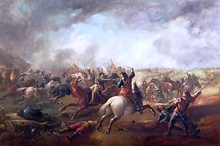John Fenwick (MP for Morpeth)
John Fenwick | |
|---|---|
 Battle of Marston Moor, where Fenwick was killed on 2 July 1644 | |
| Member of Parliament for Morpeth | |
| In office November 1640 – January 1644 (excluded) | |
| Personal details | |
| Born | 14 January 1602 Wallington Hall Yorkshire |
| Died | 2 July 1644 (aged 42) Long Marston, North Yorkshire |
| Nationality | English |
| Spouse(s) | Mary Selby |
| Alma mater | Trinity College, Cambridge |
| Occupation | MP and soldier |
| Military service | |
| Allegiance | |
| Rank | Colonel |
| Unit | Colonel John Fenwick’s Troop of Dragoons |
| Battles/wars | First English Civil War Skirmish at Corbridge; Siege of Newcastle; Battle of Marston Moor † |
John Fenwick (14 January 1602 to 2 July 1644) was a Member of Parliament from Northumberland, killed serving in the Royalist army during the First English Civil War.
Personal details[]
John Fenwick was the only son of Sir John Fenwick, 1st Baronet of Wallington Hall, Northumberland, and his first wife Katherine (1584-1616), sister to Sir Henry Slingsby, executed in 1658 for his part in a Royalist conspiracy.[1]
He married Mary, daughter of Sir George Selby, of Whitehouse, County Durham.[2]
Career[]
Fenwick matriculated from Trinity College, Cambridge at Easter 1628. He was admitted at Gray's Inn on 28 April 1630.[2]
In November 1640, Fenwick was elected Member of Parliament for Morpeth, Northumberland in the Long Parliament.[3] In early 1644, he raised a troop of dragoons for the Royalist Northern Army; [4] and was excluded from Parliament on 22 January 1644.
His troop was at the siege of Newcastle, and a skirmish near Corbridge in 1644.[5] He was killed at the Battle of Marston Moor on 2 July 1644.[2]
References[]
- ^ Scott 2004.
- ^ a b c "Fenwick, John (FNWK628J)". A Cambridge Alumni Database. University of Cambridge.
- ^ Willis 1750, p. 234.
- ^ Plant.
- ^ Hodgson & Hodgson-Hinde 1827, p. 256.
Sources[]
- Hodgson, John; Hodgson-Hinde, John (1827), A History of Northumberland: The topography and local antiquities, arranged in parishes, A History of Northumberland: In Three Parts, vol. 1:2, E. Walker, p. 256
- Willis, Browne (1750). Notitia Parliamentaria, Part II: A Series or Lists of the Representatives in the several Parliaments held from the Reformation 1541, to the Restoration 1660 ... London. pp. 240, 247.
- Plant, David. "Colonel John Fenwick's Troop of Dragoons". BCW Project. Retrieved 9 January 2021.
- Scott, David (2004). "Slingsby, Sir Henry, first baronet". Oxford Dictionary of National Biography (online ed.). Oxford University Press. doi:10.1093/ref:odnb/25727. (Subscription or UK public library membership required.)
- 1644 deaths
- English MPs 1640–1648
- Cavaliers
- People killed in the English Civil War
- People from Northumberland
- Alumni of Trinity College, Cambridge
- Heirs apparent who never acceded
- Military personnel of the English Civil War
- 1602 births